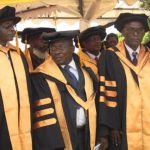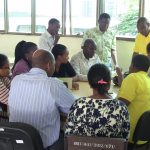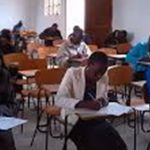Bachelor of Library & Information Management (BLIM)
Bachelor of Library and Information Management has been developed in response to the demand for a large number of trained personnel in libraries, documentation and information centres. Another reason is due to repeated requests by practitioners in the Library Science profession who need further training opportunities through a distance-learning mode of delivery that is both flexible and affordable. The Bachelor of Library and Information Management Programme is offered through distance learning mode. The main medium of instruction will be through print materials and ICT supported e-materials. To qualify for the award of a degree, a candidate must clear all the three levels of the degree course. The maximum duration of study is eight years but the teaching and learning process is flexible enough to allow fast learners to complete the programme earlier. A fast-learning student may cover more units in a year; hence be able to complete the courses in less than the specified average period for obtaining a degree which currently is three years. The Bachelor of Library and Information Management Programme is designed to provide student with a combination of theoretical and practical knowledge and with abilities to apply the same in various functional areas of library and information science. Graduates from the programme are expected to develop attitudes associated with progressive information services and to develop an understanding of the value, role and application of modern technology as it relates to library operations and the transfer of knowledge.
Programme Summary
Programme Informations
Option (I): Direct Entry Scheme (Form VI) Qualifications.
Possession of Certificate of Secondary Education Examination (CSEE) or equivalent, with at least four passes in approved subjects, And He/she has obtained at least two principal passes with a total of 4.0 points in any subjects in the Advanced Certificate of Secondary Education Examination (ACSEE).
Option (II) Equivalent Qualifications
Any Diploma recognized by TCU with an average of ‘B’ or GPA of 3.0 with not less than four passes at ‘O’ Level
OR Certificate in Foundation Programme (ANY) offered by the Open University of Tanzania with at least GPA of 3.0.
OR Bachelor’s degree/Advanced Diploma from a recognised University/Institution
Level | No of Courses | No of Units | Equivalent to TCU Credits |
1 | 6 | 12 | 120 |
2 | 8 | 14 | 140 |
3 | 8 | 14 | 140 |
Payments are done per unit where as one-unit for theoretical courses costs 60,000 while for practicum costs 100,000. In addition to tuition fee, students will be required to pay other charges like examination fees, essential reference books, stationaries and other related costs for attending practical sessions.
Mr. Azizi Kagugu
Email: azizi.kagugu@out.ac.tz
Mobile: 0762512521/0687687169
The outcomes of the programme are responsive to the needs, characteristics and realities of information stakeholders. It intends to acquaint the learner with the major concepts, models and theories of librarianship, archive management and records management issues. The programme also provides knowledge of library management, principles of librarianship, application of Information Technologies on services delivery.
The distribution of marks for each course is 30% for Main Timed Test (MTT) and 70% for Annual Examination (AE). At the end of each academic year, a student failing a course or more than one course is allowed to take a supplementary examination in the failed subject(s). If the student fails again after doing supplementary examinations is given a chance to repeat the course. A pass in supplementary and repeat examination is recorded as ‘C’ whatever the marks scored by the candidate.
Field practical is marked out of 100%



